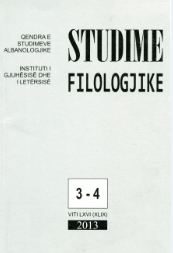FENOMENI UGJURMË” NË DISA MODELE SHKRIMI: RASTII PETRO MARKOS
THE PHENOMENON “TRACE” IN SOME MODELS OF WRITING (THE CASE PETRO MARKO)
Author(s): Etjona HoxhaSubject(s): Language and Literature Studies
Published by: Qendra e Studimeve Albanologjike
Keywords: PHENOMENON ; TRACE” IN SOME MODELS OF WRITING ; THE CASE PETRO MARKO
Summary/Abstract: The impulse to write again about the literary works of Petro Marko, in this paper, came from the re-reading of his novels, now changed. But what should not have changed to my previous reading and the reading of today, is the discovery and rediscovery of the truth of Petro Marko and the concept of truth for it. I say his truth and I refer to his constant impetus to get away from reality, to escape from it, to join another country and another world, to explore this world and other unknown spaces in order to project, reshape and use these worlds in his literary world. When I say that the process pf reading Petro Marko’s works has changed in itself and has changed me as well, I mean that many elements have changed in my previous and actual perception, of course, which are not the focus of this modest approach. But what has not changed from my previous reading, which belongs to the past, is the identification of the trace, spiritual or living one, but marked as such. Since his late works of fictional narrative status such as: “Nata e Ustikës”, (Night of Ustika), “Të thjeshtët” (The Simple people), “Hasta la vistd\ “Një emër në katër rrugë” (One name in four roads), “Cuka e shtegtarit’’ (“Cuka’s Pilgrim”), it can be concluded that the effects of his life experience are consciously dominant in them. These works include people he has met, places, explored or unexplored areas, pieces of legends, fragments of joy or grief, episodes and details of his own life, names of characters which had remained in his memory, friends and relatives, sea breeze, olives, the scent of Dhrimadhes (old Dhermi village, birthplace of writer), which is mentioned (as occurs in “Një emër në katër rrugë” (“A four street name”)), or implied. (like the countryside to the south of the country, to uCuka e shtegtarit” (“Cuka’s Pilgrim”)). It is this dismantlement and theoretical interpretation of the “trace” phenomenon, borrowed from historical narratives and its materialization in the fictional narrative of Petro Marko, which makes the aim of this paper. This approach is based on the theories of researchers Dorrit Cohn and Paul Ricoer as implied in their works The Diction of fiction and Time and narrative.
Journal: Studime Filologjike
- Issue Year: 2013
- Issue No: 03-04
- Page Range: 081-088
- Page Count: 8
- Language: Albanian

